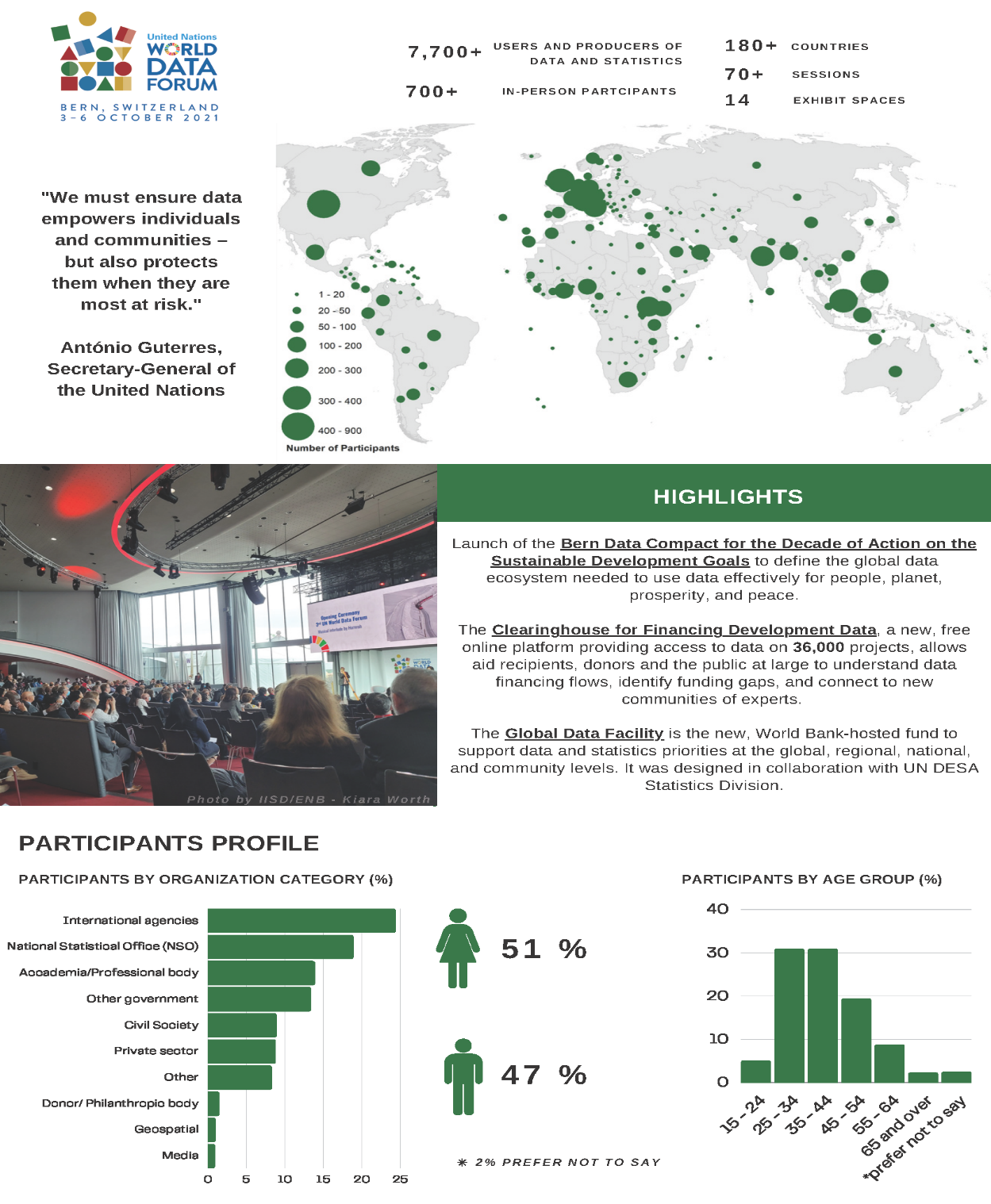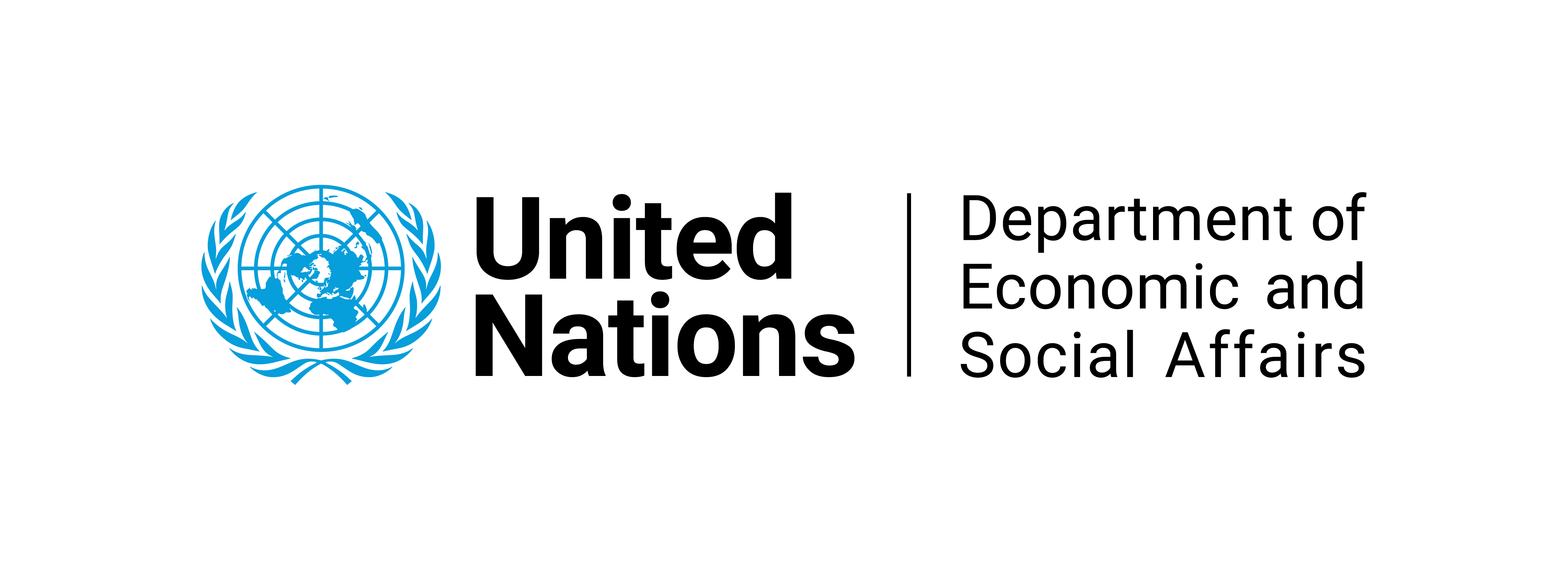17.13 Statistical forums to facilitate international cooperation#
In recent years, new discussion forums engaging players in the larger data ecosystem have been established by the international statistical system. These forums facilitate cooperation in addressing the rapid developments and increased demands for modernization of statistical systems and strengthening capacities of official statisticians to use new data sources.
These include the following:
UN World Data Forum (UNWDF);
International Conference on Big Data for Official Statistics (ICBDOS);
High-Level Group for the Modernisation of Official Statistics (HLG-MOS).
17.13.1 UNWDF (🔗)#
Following one of the main recommendations contained in the report entitled “A World That Counts” (🔗), presented in November 2014 by the United Nations Secretary-General’s Independent Expert and Advisory Group on Data Revolution for Sustainable Development, the Statistical Commission (🔗) agreed that a United Nations World Data Forum on Sustainable Development Data (UN World Data Forum) (🔗) would be the suitable platform for intensifying cooperation with various professional groups.
The UNWDF brings together data experts and users to spur data innovation, mobilize high-level political and financial support for data, and build a pathway to better data for sustainable development. Since 2020, activities related to the UNWDF has sparked the interest of over 21,000 people from Governments, academia and professional bodies, civil society, the private sector, donor and philanthropic bodies, international and regional agencies, the geospatial community and the media.
Past UNWDF have delivered important outcomes such as the Cape Town Global Action Plan (CTGAP) launched at the first UNWDF in 2017 on the priority areas for statistical and data capacity development efforts, followed by the Dubai Declaration (2018) (🔗) calling for an innovative funding mechanism to support the CTGAP; and more recently the Global data community’s response to Covid-19 (2020) (🔗) and Bern Data Compact for the Decade of Action on the Sustainable Development Goals (2021) (🔗) on how official statistics and National Statistical Offices (NSOs) position themselves during Covid-19 and in the wider data ecosystem respectively. For other key highlights from the most recent UNWDF, including details of the official launch of the Clearinghouse for Financing Development Data and the Global Data Facility, see here.
The Statistics Division of the United Nations Department of Economic and Social Affairs manages the organisation of the UNWDF, under the auspices of the Statistical Commission (🔗) and the strategic leadership of the High-level Group for Partnership, Coordination and Capacity-Building for Statistics for the 2030 Agenda for Sustainable Development (HLG-PCCB).
The fourth and next UNWDF will be hosted in Hangzhou, China between 24 and 27 April 2023 by the People’s Republic of China with substantive help from the National Bureau of Statistics (🔗). The fifth UNWDF will be hosted in Medellín, Colombia in November 2024 by the Republic of Colombia with substantive help from the Departamento Administrativo Nacional de Estadística (🔗).

Fig. 26 The 2021 Hybrid UNWDF
(11th Meeting IAEG-SDGs, Agenda item 3 presentation)(🔗)#
17.13.2 ICBDOS#
The UNSC mandated the Global Working Group on Big Data for Official Statistics (GWG-BG) to:
provide a strategic vision, direction and coordination for a global programme on Big Data for official statistics, including for indicators of the post-2015 development agenda;
encourage practical use of Big Data sources, including cross-border data, while building on existing precedents and finding solutions for the many existing challenges, including methodological issues, covering quality concerns and data analytics; legal and other issues in respect of access to data sources; privacy issues, in particular, those relevant to the use and reuse of data, data linking and re-identification; security, information technology issues and management of data, including advanced means of data dissemination, assessment of cloud computing and storage, and cost-benefit analysis;
promote capacity-building, training and sharing of experience;
foster communication and advocacy of the use of Big Data for policy applications, especially for the monitoring of the post-2015 development agenda;
build public trust in the use of Big Data for official statistics.
The International Conferences on Big Data for Official Statistics (ICBDOS) is the main platform for engaging the wider statistical community— official statisticians, data scientists, researchers—in carrying out this mandate. Five conferences have been held, with the 6th International Conference on Big Data for Official Statistics (🔗) taking place in the form of a virtual event. Like the first five, this Conference discussed the use of Big Data in other fields, such as data collection for SDG indicators and evidence-based policymaking. But with the challenging situation brought about by the huge demand for data in the context of COVID-19, the topics increased scrutiny in accelerating the use of Big Data—honing in on how new technologies -such as AI and machine learning- can be used to assess the socio-economic impact of COVID-19.
17.13.3 HLG-MOS#
The UNECE High-Level Group for the Modernisation of Official Statistics (HLG-MOS) was formed in 2010 by a group of chief statisticians interested in pooling resources, sharing experiences, improving efficiency and accelerating the pace of modernisation within the official statistics community. It reports to the Conference of European Statisticians annually and has been asked to provide regular updates to the UN Statistical Commission.
The HLG-MOS oversees two major international collaboration projects each year, as well as expert groups on specific aspects of modernisation, including standards, human resources and various aspects of the methodology. A “Blue-Skies Thinking Network” acts as the innovation hub, exploring new ideas to see if they have the potential to add value for official statistics. Annual HLG-MOS workshops bring together chief statisticians and experts from around the world, to identify the key priorities for the international statistical community in the coming year. Outputs have included a suite of modernisation models and standards, including the globally used Generic Statistical Business Process Model (GSBPM), the Common Statistical Production Architecture (CSPA), and guidelines on the use of Big Data, strategic communications and machine learning.
More information about the HLG-MOS activities and outputs can be found on its wiki (🔗).
